Challenges
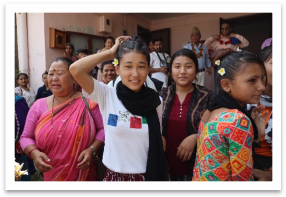 Sustainable agriculture value chain development in the Khajura Rural Municipality (the KRM) of Nepal is challenged by the need for local stakeholders to acquire skills in horticulture and livestock production skills. For horticulture, the challenge is low yield and less developed field cultivation. For poultry raising, the patterns are still traditional, causing the less economic return from poultry raising.
Sustainable agriculture value chain development in the Khajura Rural Municipality (the KRM) of Nepal is challenged by the need for local stakeholders to acquire skills in horticulture and livestock production skills. For horticulture, the challenge is low yield and less developed field cultivation. For poultry raising, the patterns are still traditional, causing the less economic return from poultry raising.
Due to global COVID-19 pandemic, project implementation keeps ongoing without on-site engagement by Chinese experts. Remote support through video training courses and virtual study tour were extended with online exchange. Video training courses are delivered in English, while agricultural experts, technicians and smallholders in the KRM attended the on-site training. Since English is not the preferrable language for local smallholders, the agricultural experts supported training delivery in Nepali and local language. The language challenge also restrained more smallholders from the video sharing. Meanwhile, one year seems too short to achieve consolidate outputs of any agricultural projects and evaluate actual impacts of agricultural value chain development.
Solutions
Objectives
Sustainable Agriculture and Value Chain Development SSTC Cities Project Pilot Initiative in Nepal aims to advance sustainable agriculture value chain development in the KRM, and to improve local stakeholder’horticultural and livestock production skills, through
1)Delivering operational agricultural knowledge and techniques of tomato and onion cultivation and chicken raising
2)Sharing adaptive techniques of tomato and onion cultivation, field management, and chicken raising
3)Showcasing practical agricultural technologies through video courses and virtual tour.
Engagement
From March 2021 to May 2022, WFP China Centre of Excellence for Rural Transformation (WFP China COE), UNOSSC Cities Project team and the KRM authority in coordination with UNDP Nepal and WFP Nepal, with the technical support from the Foreign Economic Cooperation Centre of the Ministry of Agriculture and Rural Affairs of P. R. China (FECC), have conducted all project activities and events.
Training video courses were pre-recorded by 14 Chinese experts, and the study tour was taken virtually upon the consensus of all stakeholders.
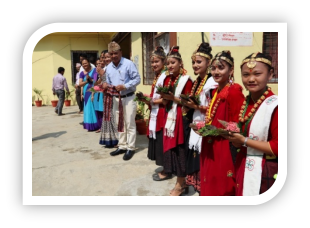
The on-site training in Nepal was organized by the KRM with the support from UNDP Nepal. A total of 35 participants joined the 7-day technical training. One demonstration site of tomato cultivation technology is under construction. There will be 230 beneficiaries as estimated to be benefited from the field demonstration including technical guidance circulation.
Innovative Approach and its Systematicity
Training Courses and Virtual Study Tour
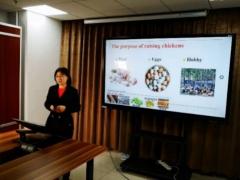
A series of training video courses in total 28 hours was finalized, and the structure of the video course includes two parts: theoretical part and virtual study tour. The theoretical part includes 10 courses of vegetable cultivation techniques and 11 courses of poultry raising techniques, while each course lasts 1-2 hours. The virtual study tour part includes 2 tours mainly. Specifically, 40-mints video of vegetable cultivation and management practice and 60-mints video of chicken raising and management practice.
On-site Training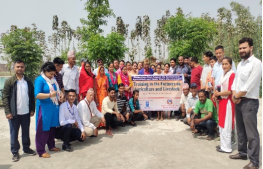
The KRM authority organized the on-site training with support from UNDP Nepal from 23 to 29 March 2022. In total, 40 participants including 14 women took part in the training. Agricultural experts from KRM, who learned from the video courses in English, introduced knowledge and techniques in Nepali. To figure out the possible issues in time and improve the project activities further, the post-survey was circulated among all participants in the last day of on-site training.
Online Exchange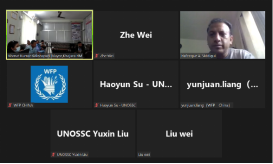
Following the on-site training, the online exchange was organized by WFP China COE. To deliver the exchange more efficiently and accurately, the KRM authority shared a list of technical questions with Chinese experts in advance. During the online exchange, the Chinese expert answered those questions in detail including fertilizer usage, field management under high temperatures, disease and pest control, tomato root problems, etc.
Technical Guidance
Combined with training courses and online exchange, three technical guidance are developed focusing on tomato and onion cultivation and chicken raising with around 30,000 words. The technical guidance provides solutions of agricultural production for smallholders and agricultural technicians, particularly on most difficult technical issues such as chicken disease control and vegetable field management. Technical guidance will be distributed to the local smallholders.
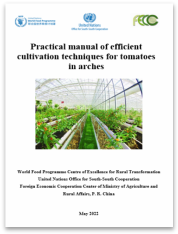
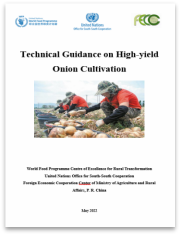
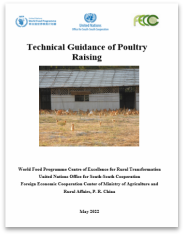
Field Demonstration
In early May 2022, the tomato seedlings were transplanted under plastic tunnel of 500-600 sqm on demonstration site in the KRM. Transplantation of the seedlings to demonstration-site will continue as new seedling is cultured. The seedlings will be transplanted into two plots: one under plastic shed about 300 sqm, and the other in open plot. This is helpful to check difference in plant growing progress and assess risks on the two methodologies. Tomato will be ready to harvest at the end of August. Thirty smallholder farmers are going to join the demonstration site construction. About 200 smallholder farmers will benefit from the demonstration.
● Review and M & E
The performance of the project is monitored according to the Result Framework with five Outputs including 12 indicators at operational level.
Output 1: Knowledge on agricultural needs in Nepal and project workplan
Output 2: Capacity building activities benefiting local people
Output 3: Advocacy and knowledge products
Output 4: Partnerships and sectoral cluster on sustainable management
Output 5: Result-oriented monitoring, evaluation, and reporting
A total of four quarterly progress reports have been submitted to review the key result of the project and in each quarter. To support the project implementation and management, three Workshops and one Review Meeting were organized. Two working-level meetings have been held to discuss specific themes. The communication and exchanges between WFP China COE and other partners are remained for tackling possible issues and facilitating project activities.
For the UNOSSC Cities Cluster engagement, WFP China, the KRM and Beijing Academy of Agriculture and Forestry Sciences have joined the UNOSSC Cities Cluster as members. FECC and WFP Nepal have been invited to join the Cluster and the internal procedure is ongoing.
Key Results
1Needs Assessment Report completed
1Factsheet and 1 Good Practice prepared
1demonstration site with 500 sqm constructed
3 technical guidance on tomato and onion cultivation and chicken raising developed
2surveys circulated and 1 analysis reports completed
3 workshops and review meeting convened
3city and institutions joined the UNOSSC Cities Cluster and other 2 institution
5 project progress and summary reports completed
6 agencies involved in the project, including UNOSSC, WFP China COE, WFP Nepal, UNDP Nepal, FECC and the KRM authority
14 experts from 4 academic institutions and universities in China invited to share knowledge and techniques on vegetable cultivation and poultry raising
28 hours of training video courses and virtual tour developed and delivered
40 participants joined the on-site training in KRM
200 indirect beneficiaries benefited from on-site technical trainings
230 smallholders to be engaged in field demonstration with technical guidance
Recommendation
●Longer project cycle motivates sustainable impact of the agriculture project. Agriculture is the industry with characteristics of long cycle and low retribution. The longer agricultural project cycle could provide more opportunities for smallholders to learn agricultural technologies at different crop stages and to deepen the understanding of technology application. It also strengthens the result and sustainability of the agriculture project.
●More extensive knowledge sharing expands the influence of South-South Cooperation. The coverage of the current project is modest, but knowledge products could reach as many people as possible. The video courses can be replayed, and the technical guidance can be shared with more smallholders beyond the project beneficiaries. National and international media could play the important role to facilitate the sharing of knowledge products widely.
●Stronger local coordination mechanism enhances the multi-stakeholder project implementation. More efficient local coordination could improve the local needs assessment, project progress monitoring and evaluation. The cooperation between partners will be deepen if the local coordination mechanism could be strengthened, which could also facilitate both implementation and management of multi-stakeholder project effectively.
Category
SSTC Cities Project Pilot Initiative in Nepal
Contributor
SSTC Cities Project Pilot Initiative in Nepal
Country
Case Study

